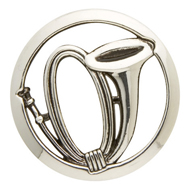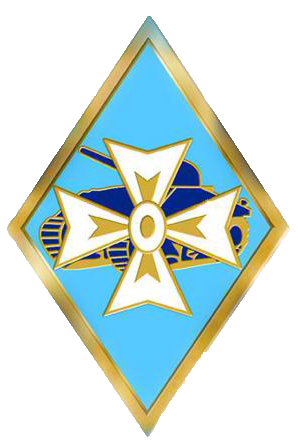
Chasseur, a French term for "hunter", is the designation given to certain regiments of French and Belgian light infantry or light cavalry to denote troops trained for rapid action.

The chasseurs alpins are the elite mountain infantry force of the French Army. They are trained to operate in mountainous terrain and in urban warfare.
This is the complete order of battle of opposing forces at the Battle of Balaclava.
The structure of the French Army is fixed by Chapter 2 of Title II of Book II of the Third Part of the Code of Defense, notably resulting in the codification of Decree 2000-559 of 21 June 2000.

The 7th Armoured Brigade is an armoured brigade of the French Army. It carries on the traditions and honours of the 7th Armoured Division.

The 1st Armored Division is a unit of the French Army formed during World War II that took part in the Liberation of France.

The 3rd Armoured Division is a unit of the French Army. The Division is the heir of the 3rd Algerian Infantry Division formed in 1943 and dissolved in 1946, which contributed in the liberation of Marseille during the Second World War.
The military reserve forces of France are the military reserve force within the French Armed Forces.

The 27e bataillon de chasseurs alpins is a Chasseurs alpins battalion of the French Army. It is a heavily decorated unit, whose members wear the fourragère of the Legion of Honour.

The Fortified Sector of the Dauphiné was the French military organization that in 1940 controlled the section of the Alpine Line portion of the Maginot Line facing Italy in the vicinity of Briançon. By comparison with the integrated defenses of the main Maginot Line, or even of the Fortified Sector of the Maritime Alps to the south, the Dauphiné sector consisted of a series of distinct territories that covered two main invasion routes into France: the route from Turin over the Col de Montgenèvre to Briançon and Grenoble, and the route from Coni over the Col de Larche to Barcelonette and Gap. The sector was the scene of probing attacks by Italian forces during the Italian invasion of France in 1940, in which the French defenses successfully resisted Italian advances until the June 1940 armistice that granted Italy access to southeastern France.

The Army of Châlons was a French military formation that fought during the Franco-Prussian War of 1870. Formed in the camp of Châlons on August 17, 1870, from elements of the Army of the Rhine which the formation was issued from, the Army of Châlons was engaged in combats of Beaumont and Sedan while disappearing during the capitulation of September 2, 1870.

The following is a hierarchical outline for the French Land Army at the end of the Cold War. It is intended to convey the connections and relationships between units and formations. The theoretical combat strength of the army was 295,989 soldiers, of the 557,904 individuals available for service across the entire French Armed Forces in 1989.

The Army of the Rhine was a French military unit that fought in the Franco-Prussian War. It was created after the declaration of war on July 18 1870.
The 14th Military Division was a division sized unit of the Vichy France army. The division was formed in late 1940 and demobilized in late 1942. It was under the control of the 1st Military Corps and controlled units in East France notably on the Swiss border.

The Fanfare du 27e Bataillon de Chasseurs Alpin is a military band unit of the French Army. The band is attached the 27e bataillon de chasseurs alpins and effectively serves as the regimental band of the Chasseurs Alpins, being that it is the single and last fanfare band of the regiment as well as this combat arm of the Army.
In France, the Operational Defence of the Territory is according to the Code of Defence, the participation of the French Armed Forces "To maintain the freedom and continuity of action of the Government, as well as to safeguard the organs essential to the defense of the nation."

The 15th Military Division also known as the 15th Military Region was an infantry formation of division-size of the Armistice Army that was active during World War II. The division's headquarters was in Marseille. This division was subordinated to the 1st Group of Military Divisions.












